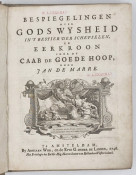First Edition: 178, (xxvii aanteekeningen) pages, engraved vignette on the title page, engraved chapter head-piece at the beginning the text and a tail-piece, full contemporary vellum, two small name stamps on the title page, light foxing, bookplate on the front free endpaper, a very good copy.
(https://af.wikipedia.org/wiki/Jan_de_Marre) ‘Jan Harmenszoon de Marre (23 August 1696 in Amsterdam – 19 January 1763, Amsterdam) was the son of Harmen de Marre and Geesje Poster and was born on 23 August 1696 in Amsterdam . His schooling was poor and limited to primary school. He was already in the service of the Dutch East India Company (VOC) from 1708 and later became a ship's captain. During his 23 years with the VOC he made a number of trips to the East and visited the Cape in 1728 and again in 1731, the last time as captain of the ship Heesburg and as vice-admiral of the return fleet. In 1832 he settled permanently in Amsterdam and later became director of the Amsterdam theatre. Under his leadership the theatre experienced a great boom, as the quality of the works performed improved and the acting was also of high quality, with the best actors of the time performing regularly. In 1744 he provided the necessary information to the cartographers to publish the East Indian Archipelago and the sea routes to it, which had been kept secret until then. These maps were published in the sixth volume of the “Zee Fakkel” in 1753. He died in Amsterdam on 19 January 1763.’
‘For Afrikaans he is particularly important for his long poem Eerkroon voor de Caab de Goede Hoop in which he describes the settlement at length in three cantos. The first canto sketches the natural beauty and climate of the Cape. The second canto views the Cape from the sailor's point of view when he reaches the safety of Table Bay despite the violence of the southeast wind. The third canto is a glorification of the VOC who saw the importance of the Cape. The poem is clearly written as praise and depicts the civilized colonists and their achievements in glowing terms, while the wild nature and original inhabitants are seen more negatively. Fragments from this poem are included in Gerrit Komrij's anthology Die Afrikaanse poësie in 'n kuisdijk en enkele gedigte.’
- Overall Condition: Very good
- Size: Small 4to (210 x 160 mm)
- Sold By: Clarke's Africana & Rare Books
- Contact Person: Paul Mills
- Country: South Africa
- Email: [email protected]
- Telephone: 021 794 0600
- Preferred Payment Methods: Visa & Mastercard via PayGate secure links and Bank transfers.
- Trade Associations: ABA - ILAB, SABDA
















